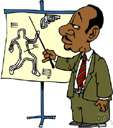ev·i·dence
(ĕv′ĭ-dəns)n.
1.
a. A thing or set of things helpful in forming a conclusion or judgment: The broken window was evidence that a burglary had taken place. Scientists weighed the evidence for and against the hypothesis.
b. Something indicative; an indication or set of indications: saw no evidence of grief on the mourner's face.
2. Law
a. The means by which an allegation may be proven, such as oral testimony, documents, or physical objects.
b. The set of legal rules determining what testimony, documents, and objects may be admitted as proof in a trial.
tr.v. ev·i·denced, ev·i·denc·ing, ev·i·denc·es
Idiom: To indicate clearly; exemplify or prove: Her curiosity is evidenced by the number of books she owns.
in evidence
1. Plainly visible; to be seen: It was early, and few pedestrians were in evidence on the city streets.
2. Law As legal evidence: submitted the photograph in evidence.
[Middle English, from Old French, from Late Latin ēvidentia, from Latin ēvidēns, ēvident-, obvious; see evident.]
American Heritage® Dictionary of the English Language, Fifth Edition. Copyright © 2016 by Houghton Mifflin Harcourt Publishing Company. Published by Houghton Mifflin Harcourt Publishing Company. All rights reserved.
evidence
(ˈɛvɪdəns)n
1. ground for belief or disbelief; data on which to base proof or to establish truth or falsehood
2. a mark or sign that makes evident; indication: his pallor was evidence of ill health.
3. (Law) law matter produced before a court of law in an attempt to prove or disprove a point in issue, such as the statements of witnesses, documents, material objects, etc. See also circumstantial evidence, direct evidence
4. (Law) turn queen's evidence turn king's evidence turn state's evidence (of an accomplice) to act as witness for the prosecution and testify against those associated with him or her in crime
5. in evidence on display; apparent; conspicuous: her new ring was in evidence.
vb (tr)
6. to make evident; show clearly
7. to give proof of or evidence for
Collins English Dictionary – Complete and Unabridged, 12th Edition 2014 © HarperCollins Publishers 1991, 1994, 1998, 2000, 2003, 2006, 2007, 2009, 2011, 2014
ev•i•dence
(ˈɛv ɪ dəns)n., v. -denced, -denc•ing. n.
1. that which tends to prove or disprove something; ground for belief; proof: The play's long run on Broadway is evidence of its great popularity.
2. something that makes evident; an indication or sign: His flushed look was evidence of his fever.
3. data presented to a court or jury to substantiate claims or allegations, including testimony, records, or objects.
v.t. 4. to make evident or clear; show clearly; manifest: to evidence one's approval.
5. to support by evidence.
Idioms: in evidence, plainly visible; conspicuous.
[1250–1300; Middle English < Middle French < Latin]
Random House Kernerman Webster's College Dictionary, © 2010 K Dictionaries Ltd. Copyright 2005, 1997, 1991 by Random House, Inc. All rights reserved.
evidence
, proof - Evidence—from Latin e-, "out," and videre, "to see"— is information that helps form a conclusion; proof is factual information that verifies a conclusion.See also related terms for proof.
Farlex Trivia Dictionary. © 2012 Farlex, Inc. All rights reserved.
evidence
Evidence is anything that you see, hear, or read that causes you to believe that something is true or has really happened.
We saw evidence everywhere that a real effort was being made to promote tourism.
There was no evidence of problems between them.
Evidence is an uncountable noun. Don't talk about 'evidences' or 'an evidence'. However, you can talk about a piece of evidence.
The finding is the latest piece of evidence that vaccines can help prevent cancer.
It was one of the strongest pieces of evidence in the Crown's case.
Collins COBUILD English Usage © HarperCollins Publishers 1992, 2004, 2011, 2012
evidence
Past participle: evidenced
Gerund: evidencing
| Imperative |
|---|
| evidence |
| evidence |
Collins English Verb Tables © HarperCollins Publishers 2011
ThesaurusAntonymsRelated WordsSynonymsLegend:
| Noun | 1. |  evidence - your basis for belief or disbelief; knowledge on which to base belief; "the evidence that smoking causes lung cancer is very compelling" evidence - your basis for belief or disbelief; knowledge on which to base belief; "the evidence that smoking causes lung cancer is very compelling"information - knowledge acquired through study or experience or instruction probable cause - (law) evidence sufficient to warrant an arrest or search and seizure; "a magistrate determined that there was probable cause to search the house" cogent evidence, proof - any factual evidence that helps to establish the truth of something; "if you have any proof for what you say, now is the time to produce it" track, trail, lead - evidence pointing to a possible solution; "the police are following a promising lead"; "the trail led straight to the perpetrator" symptom - (medicine) any sensation or change in bodily function that is experienced by a patient and is associated with a particular disease sign - (medicine) any objective evidence of the presence of a disorder or disease; "there were no signs of asphyxiation" |
| 2. | evidence - an indication that makes something evident; "his trembling was evidence of his fear" smoking gun - indisputable evidence (especially of a crime) footprint evidence - evidence in the form of footprints; "there was footprint evidence that he had been at the scene of the crime" record - anything (such as a document or a phonograph record or a photograph) providing permanent evidence of or information about past events; "the film provided a valuable record of stage techniques" testimonial, testimony - something that serves as evidence; "his effort was testimony to his devotion" argument, statement - a fact or assertion offered as evidence that something is true; "it was a strong argument that his hypothesis was true" attestation - the evidence by which something is attested indicant, indication - something that serves to indicate or suggest; "an indication of foul play"; "indications of strain"; "symptoms are the prime indicants of disease" identification - evidence of identity; something that identifies a person or thing | |
| 3. |  evidence - (law) all the means by which any alleged matter of fact whose truth is investigated at judicial trial is established or disproved evidence - (law) all the means by which any alleged matter of fact whose truth is investigated at judicial trial is established or disprovedinfo, information - a message received and understood exhibit - an object or statement produced before a court of law and referred to while giving evidence testimony - a solemn statement made under oath corpus delicti - the body of evidence that constitute the offence; the objective proof that a crime has been committed (sometimes mistakenly thought to refer to the body of a homicide victim) direct evidence - evidence (usually the testimony of a witness) directly related to the fact in dispute circumstantial evidence, indirect evidence - evidence providing only a basis for inference about the fact in dispute corroborating evidence - additional evidence or evidence of different kind that supports a proof already offered in a proceeding hearsay evidence - evidence based on what someone has told the witness and not of direct knowledge state's evidence - evidence for the prosecution in criminal proceedings law, jurisprudence - the collection of rules imposed by authority; "civilization presupposes respect for the law"; "the great problem for jurisprudence to allow freedom while enforcing order" | |
| Verb | 1. |  evidence - provide evidence for; stand as proof of; show by one's behavior, attitude, or external attributes; "His high fever attested to his illness"; "The buildings in Rome manifest a high level of architectural sophistication"; "This decision demonstrates his sense of fairness" evidence - provide evidence for; stand as proof of; show by one's behavior, attitude, or external attributes; "His high fever attested to his illness"; "The buildings in Rome manifest a high level of architectural sophistication"; "This decision demonstrates his sense of fairness"authenticate - establish the authenticity of something attest - establish or verify the usage of; "This word is not attested until 1993" reflect - give evidence of the quality of; "The mess in his dorm room reflects on the student" reflect - give evidence of a certain behavior; "His lack of interest in the project reflects badly on him" bear witness, evidence, testify, prove, show - provide evidence for; "The blood test showed that he was the father"; "Her behavior testified to her incompetence" condemn - demonstrate the guilt of (someone); "Her strange behavior condemned her" |
| 2. | evidence - provide evidence for; "The blood test showed that he was the father"; "Her behavior testified to her incompetence" law, jurisprudence - the collection of rules imposed by authority; "civilization presupposes respect for the law"; "the great problem for jurisprudence to allow freedom while enforcing order" attest, certify, evidence, manifest, demonstrate - provide evidence for; stand as proof of; show by one's behavior, attitude, or external attributes; "His high fever attested to his illness"; "The buildings in Rome manifest a high level of architectural sophistication"; "This decision demonstrates his sense of fairness" inform - impart knowledge of some fact, state or affairs, or event to; "I informed him of his rights" presume - constitute reasonable evidence for; "A restaurant bill presumes the consumption of food" | |
| 3. | evidence - give evidence; "he was telling on all his former colleague" inform - act as an informer; "She had informed on her own parents for years" |
Based on WordNet 3.0, Farlex clipart collection. © 2003-2012 Princeton University, Farlex Inc.
evidence
noun
1. proof, grounds, data, demonstration, confirmation, verification, corroboration, authentication, substantiation There is no evidence to support this theory.
2. sign(s), mark, suggestion, trace, indication, token, manifestation Police said there was no evidence of a struggle.
3. testimony, statement, witness, declaration, submission, affirmation, deposition, avowal, attestation, averment Forensic scientists will be called to give evidence.
verb
1. show, prove, reveal, display, indicate, witness, demonstrate, exhibit, manifest, signify, denote, testify to, evince He still has a lot to learn, as is evidenced by his recent behaviour.
in evidence noticeable, obvious, visible, manifest, conspicuous, perceptible Poverty is still very much in evidence in the city.
Collins Thesaurus of the English Language – Complete and Unabridged 2nd Edition. 2002 © HarperCollins Publishers 1995, 2002
evidence
noun1. That which confirms:
2. Something visible or evident that gives grounds for believing in the existence or presence of something else:
badge, index, indication, indicator, manifestation, mark, note, sign, signification, stamp, symptom, token, witness.
1. To make manifest or apparent:
2. To establish as true or genuine:
3. To assure the certainty or validity of:
attest, authenticate, back (up), bear out, confirm, corroborate, justify, substantiate, testify (to), validate, verify, warrant.
The American Heritage® Roget's Thesaurus. Copyright © 2013, 2014 by Houghton Mifflin Harcourt Publishing Company. Published by Houghton Mifflin Harcourt Publishing Company. All rights reserved.
Translations
بُرْهان، إثْباتدَليلدَلِيل
důkaz
bevisbevismaterialetegn
näyttääosoittaatodiste
dokaz
sönnunargagnvottur, merki
証拠
증거
įkaltisįrodymas
liecībapierādījums
dokaz
bevis
หลักฐาน
bằng chứng
evidence
[ˈevɪdəns]A. N
1. (= proof) → pruebas fpl
evidence of/that → pruebas de/de que ...
circumstantial evidence → pruebas fpl circunstanciales
there is no evidence against him → no hay pruebas contra él
to hold sth in evidence → esgrimir algo como prueba
what evidence is there for this belief? → ¿qué pruebas corroboran esta creencia?
evidence of/that → pruebas de/de que ...
circumstantial evidence → pruebas fpl circunstanciales
there is no evidence against him → no hay pruebas contra él
to hold sth in evidence → esgrimir algo como prueba
what evidence is there for this belief? → ¿qué pruebas corroboran esta creencia?
3. (= testimony) → testimonio m
to call sb in evidence → llamar a algn como testigo
to give evidence → prestar declaración, deponer (more frm)
to turn King's or Queen's or > State's evidence (US) → delatar a un cómplice
to call sb in evidence → llamar a algn como testigo
to give evidence → prestar declaración, deponer (more frm)
to turn King's or Queen's or > State's evidence (US) → delatar a un cómplice
4. to be in evidence (= noticeable) → estar bien visible
Collins Spanish Dictionary - Complete and Unabridged 8th Edition 2005 © William Collins Sons & Co. Ltd. 1971, 1988 © HarperCollins Publishers 1992, 1993, 1996, 1997, 2000, 2003, 2005
evidence
[ˈɛvɪdəns] n (= proof) → preuves fpl
evidence to support a theory → des preuves à l'appui d'une théorie
there is evidence that → il est prouvé que
evidence to support a theory → des preuves à l'appui d'une théorie
there is evidence that → il est prouvé que
(= signs) to show evidence of → donner des signes de
to see evidence of → voir des signes de
to see evidence that → constater que
to be in evidence → être visible
to see evidence of → voir des signes de
to see evidence that → constater que
to be in evidence → être visible
(LAW) (against defendant) → preuves fpl
evidence against sb → des preuves contre qn
to produce sth as evidence → produire qch comme pièce à conviction
evidence against sb → des preuves contre qn
to produce sth as evidence → produire qch comme pièce à conviction
Collins English/French Electronic Resource. © HarperCollins Publishers 2005
evidence
n
→ Beweis m, → Beweise pl; show me your evidence → welche Beweise haben Sie?; what evidence is there to support this theory? → welche Anhaltspunkte gibt es, die diese Theorie untermauern?; according to the evidence of our senses → nach dem, was wir mit unseren Sinnen erkennen können; there is no evidence of … → es deutet nichts auf … hin; there is no evidence that … → es deutet nichts darauf hin, dass …; these marks are evidence of life on Mars → diese Spuren sind Beweis or ein Zeichen nt → dafür, dass es auf dem Mars Leben gibt; a scratch was the only evidence of the fight → ein Kratzer war der einzige Beweis für den Kampf; the car bore evidence of having been in an accident → das Auto trug deutliche Spuren eines Unfalls
(Jur) → Beweismaterial nt; (object, dagger etc) → Beweisstück nt; (= testimony) → Aussage f; the lawyers are still collecting evidence → die Anwälte holen immer noch Beweise ein; we haven’t got any evidence → wir haben keinerlei Beweise; there wasn’t enough evidence → die Beweise or Indizien reichten nicht aus; for lack of evidence → aus Mangel an Beweisen, mangels Beweisen (form); on the evidence available … → aufgrund or auf Grund des vorhandenen Beweismaterials …; not admissible as evidence → als Beweismittel nicht zulässig; all the evidence was against him → alles sprach or die Tatsachen sprachen gegen ihn; to give evidence (for/against somebody) → (für/gegen jdn) aussagen; to give evidence for the defence (Brit) or defense (US) /prosecution → für die Verteidigung/die Anklage aussagen; piece of evidence (= statement) → Zeugenaussage f; (= object) → Beweisstück or -mittel nt ? queen’s evidence, state’s evidence
to be in evidence → sichtbar sein; poverty was still (very) much in evidence → es gab immer noch sichtlich viel Armut; his father was nowhere in evidence → sein Vater war nirgends zu sehen; she likes to be very much in evidence → sie hat es gern, gesehen und beachtet zu werden; a statesman very much in evidence at the moment → ein Staatsmann, der zur Zeit stark beachtet wird
vt → zeugen von
Collins German Dictionary – Complete and Unabridged 7th Edition 2005. © William Collins Sons & Co. Ltd. 1980 © HarperCollins Publishers 1991, 1997, 1999, 2004, 2005, 2007
evidence
[ˈɛvɪdəns] n inv (proof) → prova; (testimony) → testimonianza; (sign) → indizio, tracciato show evidence of → mostrare segni di
evidence of a break-in → tracce di scasso
to give evidence → testimoniare, deporre
to turn King's or Queen's or (Am) State's evidence → testimoniare contro i propri complici
to be in evidence → essere visibile or in vista
she was nowhere in evidence → non la si vedeva da nessuna parte
Collins Italian Dictionary 1st Edition © HarperCollins Publishers 1995
evidence
(ˈevidəns) noun1. information etc that gives reason for believing something; proof (eg in a law case). Have you enough evidence (of his guilt) to arrest him?
2. (an) indication; a sign. Her bag on the table was the only evidence of her presence.
Kernerman English Multilingual Dictionary © 2006-2013 K Dictionaries Ltd.
evidence
→ دَلِيل důkaz bevis Beweis αποδεικτικό στοιχείο prueba todiste preuve dokaz prova 証拠 증거 bewijs bevis dowód evidência свидетельство bevis หลักฐาน kanıt bằng chứng 证据Multilingual Translator © HarperCollins Publishers 2009
evidence
n. evidencia, manifestación; [legal] evidencia, testimonio.
English-Spanish Medical Dictionary © Farlex 2012
evidence
n evidencia; There is no evidence of tumor..No hay evidencia de tumorEnglish-Spanish/Spanish-English Medical Dictionary Copyright © 2006 by The McGraw-Hill Companies, Inc. All rights reserved.